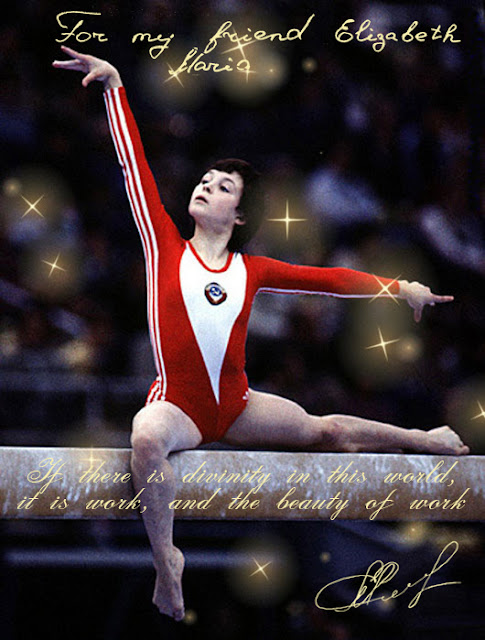Lupita translates a 23rd January article from Sovietsky Sport.
 |
| Maria Filatova looks likely to secure her Russian citizenship in February. Good luck, Maria, from all of us xxx |
This incredible story has been around for 17 years! Born in the USSR,
two-time Olympic gymnastics champion Maria Filatova has tried to obtain Russian
nationality. Now the end of this process seems to be nearer than ever.
Maria Filatova is 51. She
was born in Leninsk-Kuznetski. In 1976 and 1980 she became Olympic
champion in gymnastics. Many people remember a minuscule girl with funny bows
in her hair, who won gold and glory for our country.
After the dismantling of
the Soviet Union, Filatova worked first in Europe and later in the US. She now
lives with her husband and her daughter in Rochester (New York State). Since 1996
she has been trying to be granted a Russian passport. So far she only has an
old Soviet passport and a US green card, which don’t allow her to travel to
Leninsk-Kuznetski to visit her mother’s and her coach’s tombs.
Aman Tuleev, Governor of
the Keremovo Region, wrote to the Commission for Citizenzhip under the
President of the Russian Federation. In autumn last year, he asked to grant
Filatova with citizenship. The prestigious lawyer Aleksei Sinitsyn prepared all
the documents.
– Before last summer, before
we began to act, nobody did what had to be done in a competent way, – stated
Sinitsyn. You had to look for the law on citizenship and read it
carefully. The mechanism to be granted citizenship for persons with special
merits in the field of sport. In our case, governor Аman Tuleev submitted the President the demand to grant simplified citizenship
to Filatova, who had special merits in the field of sports.
–When was this done?
– In October 2012 the documents were sent to the Commission. We wanted to play
safe and we went to the archives of the Ministry of Sport, аs well as of the Gymnastics Federation, where we got a dossier with
Filatova’s merits and achievements. Therefore, we have the maximum amount of
documents.
–Will the decision be
taken by the Commission?
– The documents are sent to the President, but they’ll be studied by the Commission
for Citizenship. In principle, this decision belongs to the President, the Commission
is a counselling organ, created to express a position about the granting of
citizenship to someone.
– To what extent is a
positive decision likely?
– I think it’s highly likely taking into account that the information is not
questionable. I don’t find any reason to deny her citizenship. If not to her,
who else? I think everything will turn out well.
The next assembly of the Commission will take place in February. Maria Filatova will have then the possibility to become Russian.
The next assembly of the Commission will take place in February. Maria Filatova will have then the possibility to become Russian.
– Thanks, Tuleev, he’s
nice and smart! – Filatova said yesterday to ‘Sovietski Sport’ – It’s
nice that among civil servants there are some reasonable people. It seems that
the majority of them don’t know the law and only keep passing the buck.
We all hope that this turns out the right way, and that Maria finally gets her Russian passport, the right to travel wherever she likes, but most of all recognition for her lifetime of hard work and all she did, and does, for Soviet and Russian sport.
I thought it was the right time to share the gorgeous picture with my readers; it was a present from Maria, and I am very proud of it.
We all hope that this turns out the right way, and that Maria finally gets her Russian passport, the right to travel wherever she likes, but most of all recognition for her lifetime of hard work and all she did, and does, for Soviet and Russian sport.
I thought it was the right time to share the gorgeous picture with my readers; it was a present from Maria, and I am very proud of it.
Interesting. Good luck to her.
ReplyDelete